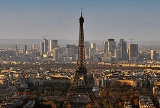
: paʁi) is the capital
and largest city in France
, situated on the river Seine
, in northern France, at the heart of the Île-de-France
region
(or Paris Region). The city of Paris, within its administrative limits (the 20 arrondissements
) largely unchanged since 1860, has an estimated population of 2,211,297 (January 2008), but the Paris metropolitan area has a population of 12,089,098, (January 2008), and is one of the most populated metropolitan areas
in Europe
.
845 Paris is sacked by Viking raiders, probably under Ragnar Lodbrok, who collects a huge ransom in exchange for leaving.
1295 The first treaty forming the Auld Alliance between Scotland and France against England is signed in Paris.
1390 First trial for witchcraft in Paris leading to the death of three people.
1418 An insurrection delivers Paris to the Burgundians.
1431 Henry VI of England is crowned King of France at Notre Dame in Paris.
1572 Marriage in Paris of the future Huguenot King Henry IV of Navarre to Marguerite de Valois, in a supposed attempt to reconcile Protestants and Catholics.
1578 King Henri III lays the first stone of the Pont Neuf (''New Bridge''), the oldest bridge of Paris.
1588 French Wars of Religion: Henry III of France flees Paris after Henry of Guise enters the city.
1765 After a campaign by the writer Voltaire, judges in Paris posthumously exonerate Jean Calas of murdering his son. Calas had been tortured and executed in 1762 on the charge, though his son may have actually committed suicide.
1778 American Revolutionary War: In Paris the Treaty of Alliance and the Treaty of Amity and Commerce are signed by the United States and France signaling official recognition of the new republic.

